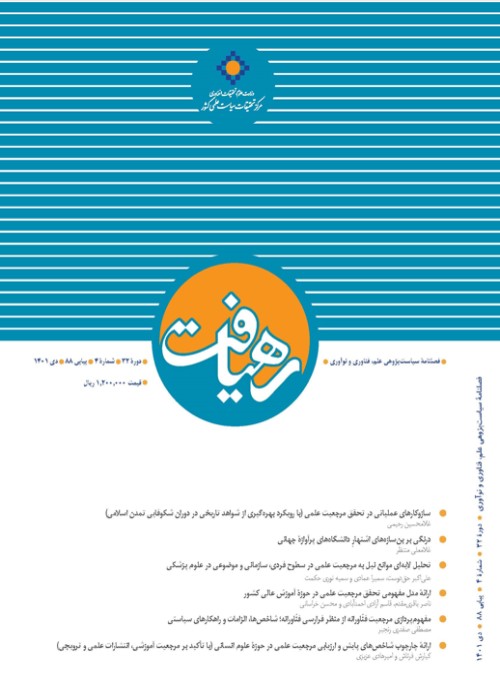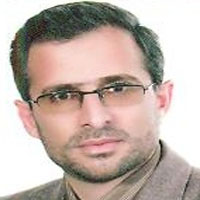Realization of Scientific Authority in the Context of Nth Generation of Universities
Author(s):
Article Type:
Research/Original Article (دارای رتبه معتبر)
Abstract:
Higher education as an organized and planned social system (Mazo, 2021) is considered to deal with all kinds of social, political, economic, and geographical inequalities in low-income and less-developed countries. This institution, as an institution that has the task of socialization, guides the seekers of knowledge in a defined process in the cognitive and psychological field and creates characteristics in him and several functions for it is listed (Shaoming & Hui-Shu, 2014; Mapulanga, 2014; Rezaei, 2019).What is the main mission of universities is a subject that is a subject of controversy and research not only in Iran, but also in the world community and the educational systems of different countries, and it has been raised as an important challenge. Challenges such as the diversity in Canadian universities, the abundance of environmental information and the early non-compliance of German universities with them, the risk of reputation, the size and international and research orientation or the degree of the academy in English universities, lack of uniformity, lack of clear direction, weak regulatory standards, lack of resources, and corruption have been introduced in Pakistan universities. This diversity in challenges led to generational paradigmatic changes in higher education and we are currently in the fifth generation. This generation sequence can somehow be attributed to the lack of understanding of the society's situation and the future compared to the real needs. Perhaps the idea of a Meta-generation University can be presented as an alternative for university generations. Meta-generation University is a university that is based on general, stable and universal principles and seeks to provide the basis for achieving the prosperity of the society by producing science, knowledge and technology. On the other hand, the issue of the academic authority of the university system is seriously emphasized in the 1404 vision document, the comprehensive scientific map of the country, and the fifth development plan. According to the research, reference strategy is identified with factors such as focus, capabilities, use of opportunities, competitive advantage, determining the scope of action and choosing the scientific field. These factors appear in the context of the university system, which is not captured by the passing waves in the scientific world and cannot forget its mission and mission despite frequent turbulences.Rereading the paradigmatic change of academic generations has at least a few clear messages: First, the university and the institution of science, research and culture, rather than being a driver, has determined and pursued its direction, subject to external developments, environmental conditions, and external requirements. Second, the expectation from the institution of science, research, and technology in the past periods has been superficial and partial, not fundamental and deep, and for this reason, we have witnessed major changes in academic generations. Thirdly, the classification of academic generations is affected by It has been the philosophy and worldview of the thinkers in this field. For this reason, with the rise and fall of philosophical theories and worldviews, these generations have been formed or gone out of center. Therefore, the classification of university generations is based on three keywords, which can be referred to as the triangle of inefficiency of universities, and those three terms are contingency, passivity, and expiration.To deal with the lack of stability in academic generations, the idea of a "Wisdom-based University" can be proposed. Wisdom-based University is an institution that is the starting point of the Islamic-Iranian model of progress. Imam Khomeini said in this regard: "If the universities are not repaired and our schools are not repaired, we have no hope of finding the Islamic Republic" (Jafari, Seyedjavadi & Zaboli, 2021). This active role of higher education and consequently the university system is because universities have basic scientific actors who conduct research at the frontiers of knowledge and establish scientific authority.The Nth generation of universities is based on three stable principles, which are comprehensiveness, multifacetedness, and intelligence, instead of the triad of contingency, passivity, and expiration. These three elements can be found more than any other model in the model of Wisdom-based University. In Meta-generation and Wisdom-based Universities, talking about generation as an approach or paradigm does not have an expiry date, but this particular university system aims to divide universities into different generations while accelerating changes. In today's environment, these classifications will be nothing but a fruitless attempt to accompany and harmonize with external developments, and we must seek to go beyond the definitions and limitations of generations, a great mission that is the truth of existence and deep insight is based on monotheistic and divine worldview, it should be at the forefront. This long-lasting academic generation emphasizes Wisdom-based Universities because it considers the mission of universities to be transcendental and trans-spatial. A university that seeks to build a society based on ethics and transcendence based on monotheistic naturalism for the education of a transcendent human being; and it is not built in response to problems, problems, and environmental issues. In other words, a Wisdom-based University does not act passively to define the environment of its mission and to give it a special generation title to create a new generation. It determines the mission of the society and human happiness
Keywords:
Language:
Persian
Published:
Rahyaft Journal, Volume:32 Issue: 87, 2022
Pages:
91 to 100
https://magiran.com/p2660086
دانلود و مطالعه متن این مقاله با یکی از روشهای زیر امکان پذیر است:
اشتراک شخصی
با عضویت و پرداخت آنلاین حق اشتراک یکساله به مبلغ 1,390,000ريال میتوانید 70 عنوان مطلب دانلود کنید!
اشتراک سازمانی
به کتابخانه دانشگاه یا محل کار خود پیشنهاد کنید تا اشتراک سازمانی این پایگاه را برای دسترسی نامحدود همه کاربران به متن مطالب تهیه نمایند!
توجه!
- حق عضویت دریافتی صرف حمایت از نشریات عضو و نگهداری، تکمیل و توسعه مگیران میشود.
- پرداخت حق اشتراک و دانلود مقالات اجازه بازنشر آن در سایر رسانههای چاپی و دیجیتال را به کاربر نمیدهد.
In order to view content subscription is required
Personal subscription
Subscribe magiran.com for 70 € euros via PayPal and download 70 articles during a year.
Organization subscription
Please contact us to subscribe your university or library for unlimited access!




